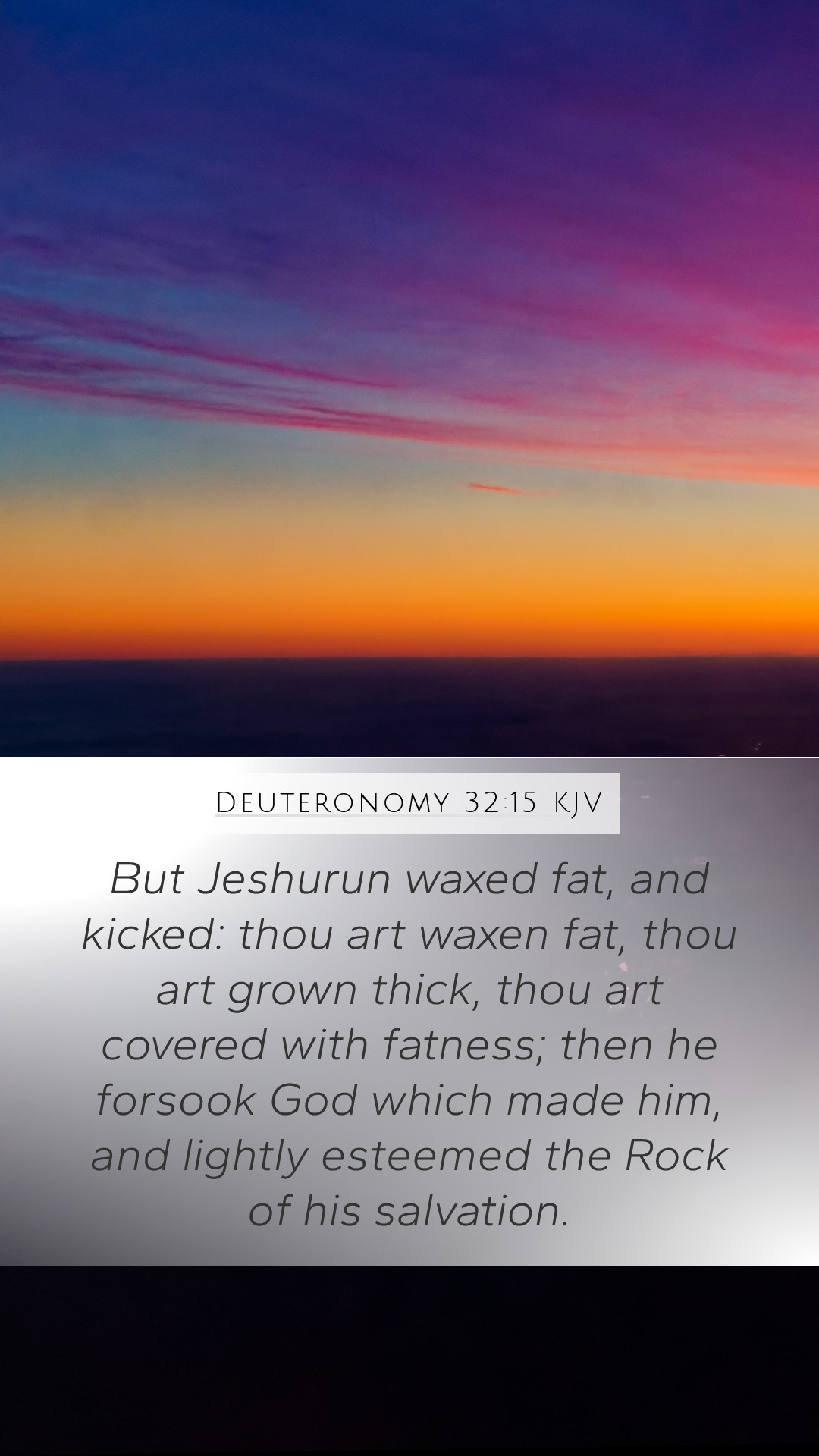Understanding Deuteronomy 32:15
Bible Verse: Deuteronomy 32:15
Verse: "But Jeshurun waxed fat, and kicked: thou art waxen fat, thou art grown thick, thou art covered with fatness; then he forsook God which made him, and lightly esteemed the Rock of his salvation."
Overview
Deuteronomy 32:15 serves as a poignant reflection on the nature of prosperity and the spiritual consequences it can entail. This verse is part of a larger song attributed to Moses, where he admonishes the people of Israel about their future behavior in the Promised Land.
Insights from Commentaries
- Matthew Henry:
Henry emphasizes the metaphor of "Jeshurun," a term of endearment for Israel, symbolizing its righteousness and uprightness. The verse warns that the abundance of blessings can lead to pride and spiritual apathy. The phrase 'waxed fat' signifies indulgence and comfort that may lead to a disregard for God.
- Albert Barnes:
Barnes interprets the term "kicked" as Israel's rebellious nature that arises from complacency. He notes that prosperity often blinds people to their need for God, leading them to forsake their Creator. He highlights that the 'Rock of salvation' refers to God, whose unchanging nature contrasts with Israel's fickleness.
- Adam Clarke:
Clarke provides a linguistic analysis, noting the implications of 'waxing fat' in terms of both physical and spiritual decline. He warns against the dangers of forgetting God's provisions and succumbing to self-reliance, thus diminishing one's connection to the divine source of sustenance and salvation.
Thematic Elements
- Prosperity and Complacency:
This verse illustrates the relationship between material prosperity and spiritual complacency. When blessings increase, there is a human tendency to forget the one who provides those blessings.
- Rebellion Against God:
Israel's metaphorical 'kicking' portrays a rebellion that often arises from comfort and self-sufficiency. This rebellion is highlighted as detrimental to their relationship with God.
- The Consequences of Forgetting God:
The abandonment of God leads to consequences not just spiritually, but in terms of national identity and moral decay. The verse suggests that neglecting divine guidance can lead to severe repercussions.
Applications to Daily Life
Understanding Deuteronomy 32:15 can be an important lesson for modern readers who strive to maintain spiritual integrity amid material success. It challenges believers to remain humble and reliant on God's guidance, ensuring that their prosperity does not lead to spiritual apathy.
- Self-Reflection: Reflect on personal endeavors and acknowledge how blessings received may affect your relationship with God.
- Community Influence: Encourage discussions in bible study groups to explore how collective prosperity can impact faith.
- Daily Prayer: Develop a habit of gratitude and seeking God’s guidance in times of abundance.
Related Bible Cross References
- Deuteronomy 8:12-14 - A warning about forgetting God in times of prosperity.
- Proverbs 30:9 - A plea for balance between poverty and riches, emphasizing dependency on God.
- Hosea 13:6 - A reflection on Israel's success leading to their forgetfulness of God.
Conclusion
The analysis of Deuteronomy 32:15 provides a critical look at the potential pitfalls of prosperity. It serves as a reminder that continual dependence on God is vital, even in times of success. This verse invites us to maintain our devotion and gratitude, no matter the blessings we encounter.
For those seeking deeper bible verse meanings, bible study insights, and understanding Scripture, this verse remains a powerful illustration of the human condition and our relationship with the divine.


